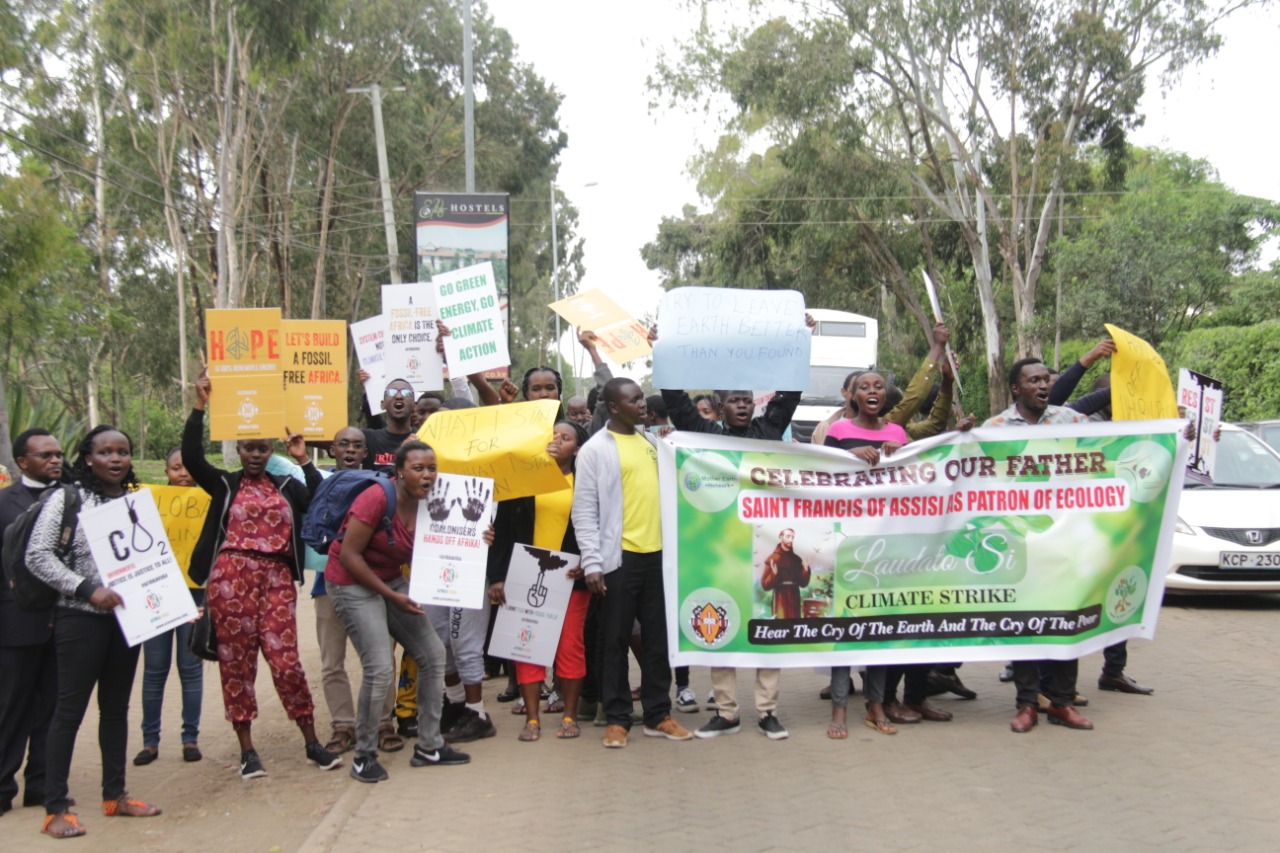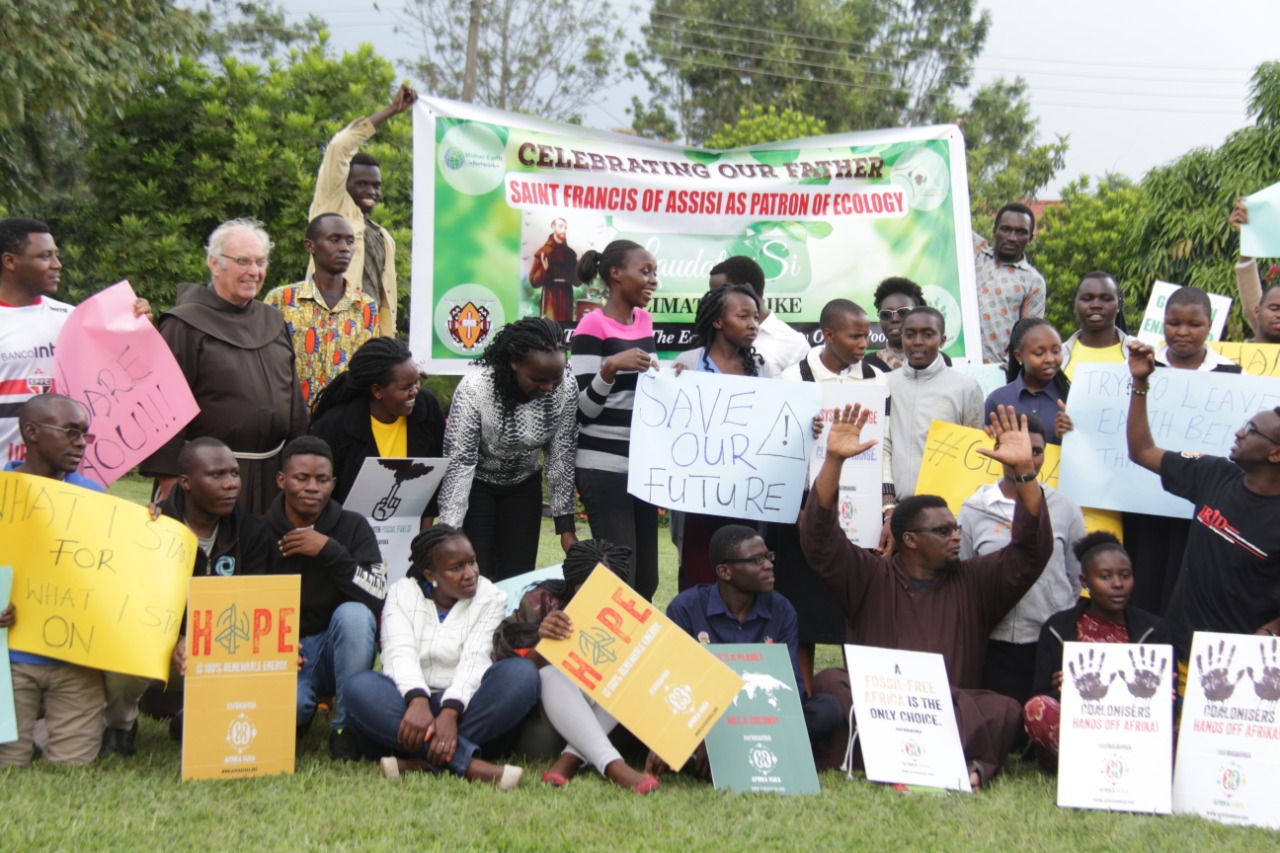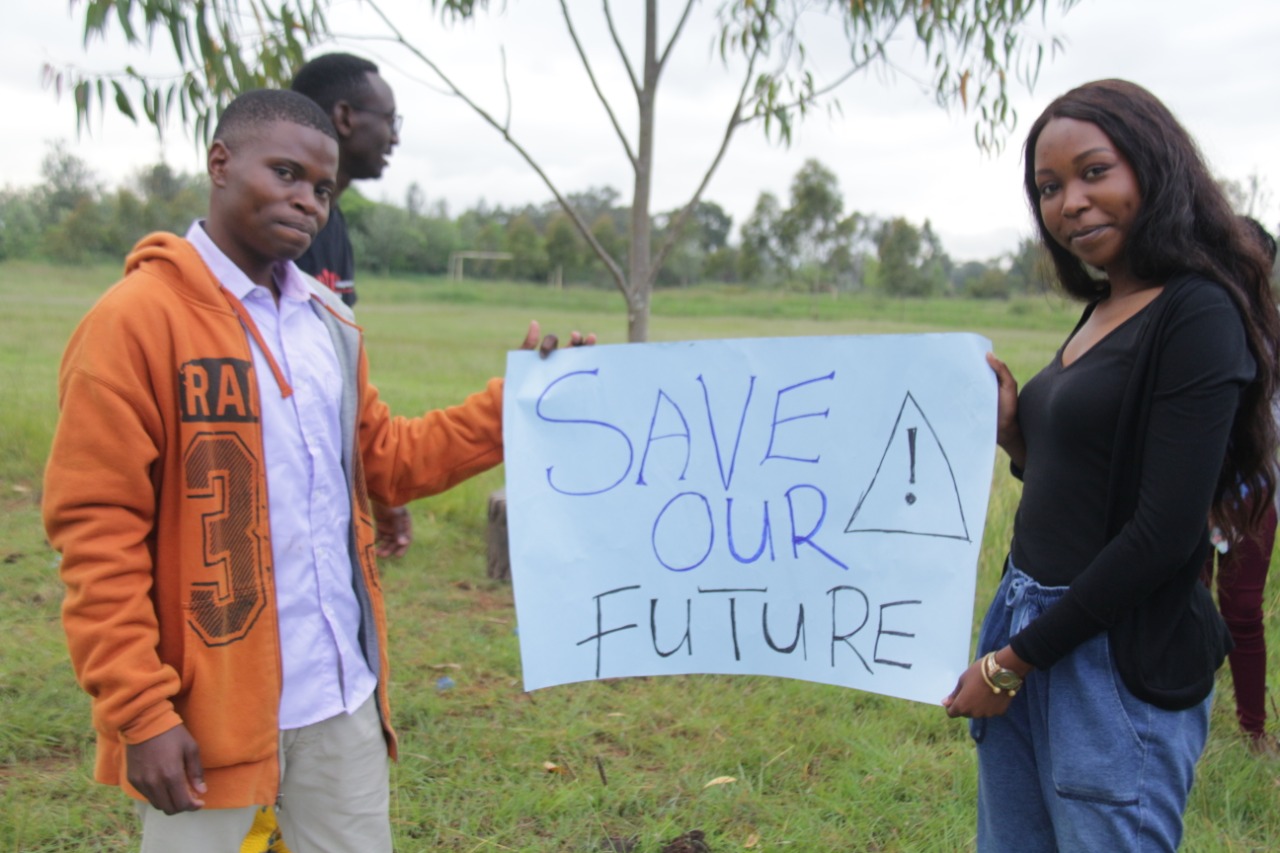People of Onupi and Nigeria do not need coal
“I want the Federal Government to intercede for us so our women won't experience miscarriage again". "If the government was providing social amenities to community members, then we would have never accepted the destructive coal mining activities". Those are words of respectively Mrs Agagwu Rachel and Mr Alfa Stephen, the chairman of Onupi Coal Committee when attending the civil society meeting organized by GIFSEP and partners like International Center for Investigative Reporting (ICIR), Heinrich Boll Foundation, Climate and Sustainable Development Network and Global Rights to mark World Social Justice Day.
The meeting was an opportunity for community leaders and civil society groups to strategize on the way forward in ensuring the voices of the community members in both Kogi and Gombe states are heard and to advocate for a coal-free society that keeps social justice and safety at the forefront.
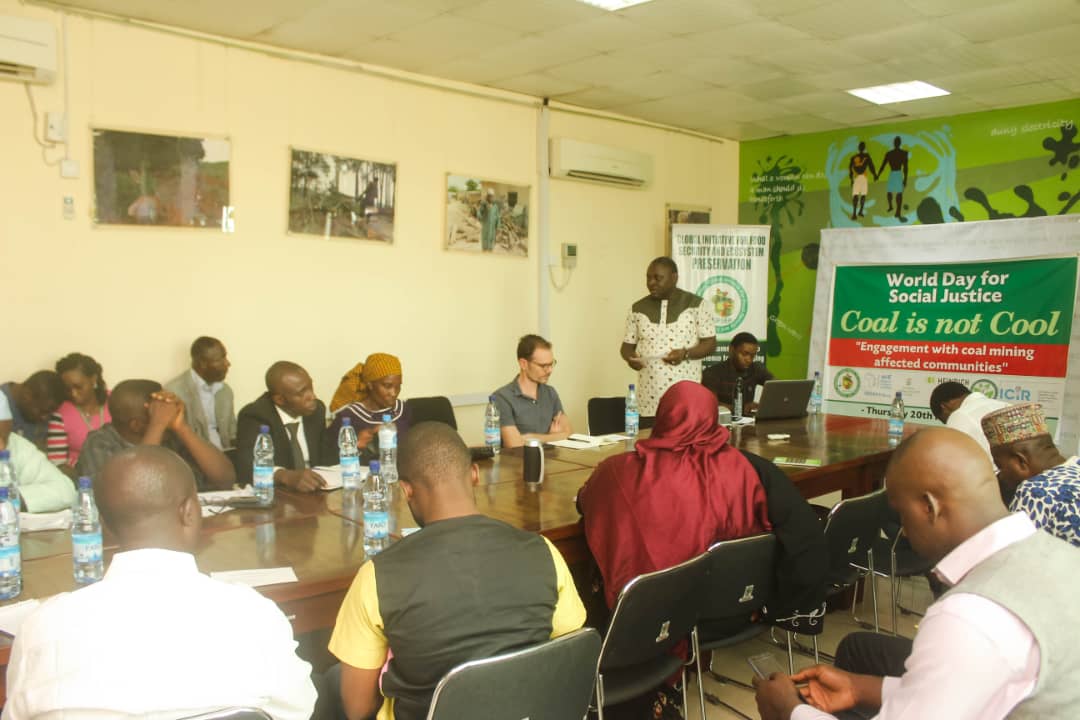
The gathering was inspired by a research GIFSEP did last year to ascertain the status of coal mining and to identify the actors and financiers of coal mining in Nigeria. The research carried out by the International Center for Investigative Reporting (ICIR) in Kogi and Gombe states with support from 350.org was a response to the shift in fossil fuel investment caused by Nigeria’s yawning gap in power generation and supply, which prompted many stakeholders including the members of the National Assembly to demand coal-powered stations.
This research revealed serious troubling impacts local communities are now confronted due to the activities of Dangote coal mine. These impacts include the destruction of water sources contamination of alternative borehole sources, health issues like high rates of miscarriage. More detailed information about the research’s findings can be viewed here.
Community members of Kogi and Gombe states alongside others in Nigeria intend to continue raising their voices to ensure their right to a clean and healthy environment filled with sustainable prosperity. According to participants, the meeting was just the beginning of the journey towards a coal-free Onupi and Nigeria.
Climate Defenders gathering: Towards a consolidated strategy
Fifty climate defenders and activists from 23 countries gathered in Curitiba, Brazil from February 5th to 8th to share the stories of their struggles and to build a stronger community of climate defenders.
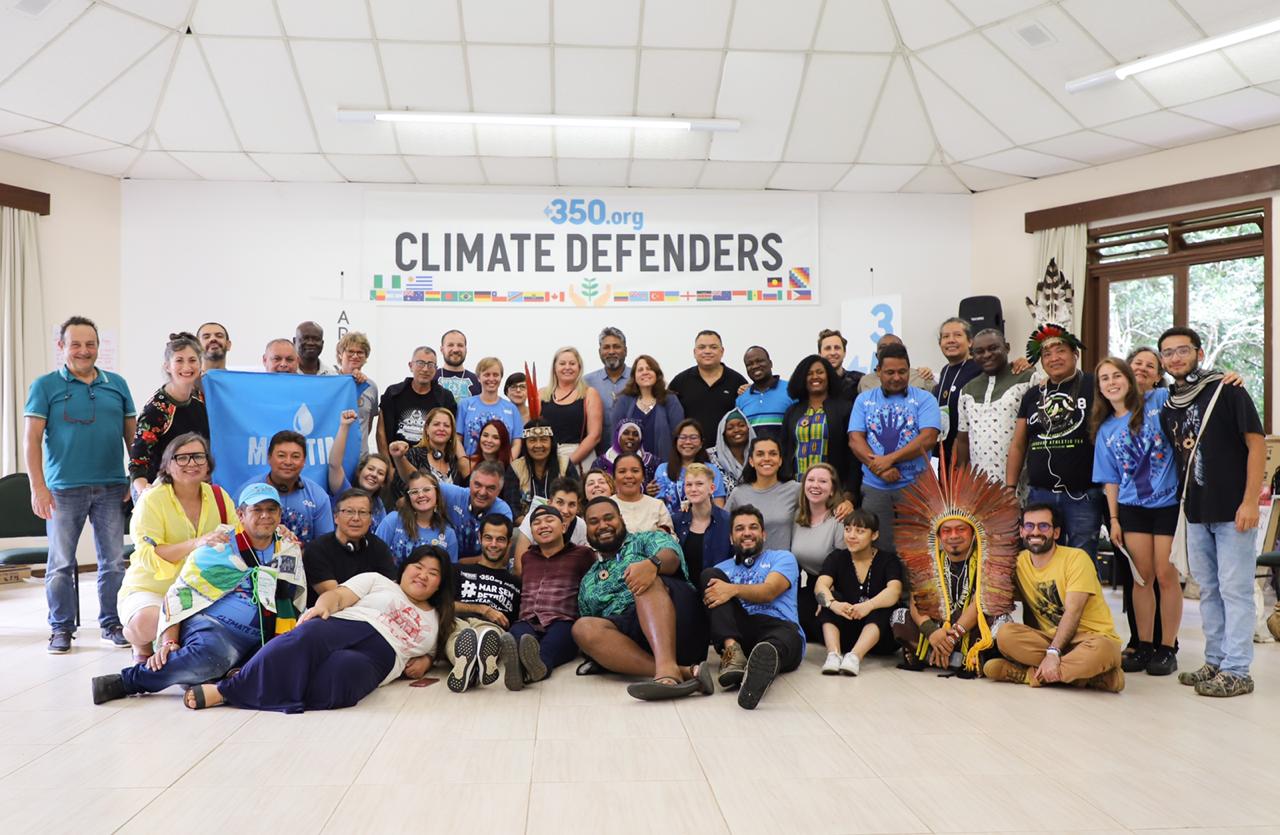
Everywhere climate defenders are facing threats, intimidation, and increased repression as they protect the planet from destruction. In most cases, the fossil fuel industry is responsible for the most severe and disturbing violations of human rights. This gathering provided a space to share experiences, skills and tactics and build a coherent strategy for reacting to crisis moments, including increased visibility, communications strengthened leadership, rapid response and building alliances of legal support.
African representatives at the gathering shared the most common threats they are confronted with, including intimidation by government officials and police, restricted movements and surveillance, forced removal of communities and sometimes verbal abuse by being labelled for instance as ‘anti-development’ activists. They denounced the fossil fuel companies working hand in hand with corrupt politicians, security forces and sometimes private militia in perpetrating such disturbing violations of human rights and freedom.
During the gathering, 350.org launched the Climate Defenders report on Human Rights Abuses by Fossil Fuel Companies. The report highlighted some specific cases from Africa where companies such as Shell in Nigeria) and Amu Power in Lamu (Kenya) are involved. The report shows successful strategies that activists are taking to fight these cases.
"Chevron-Texaco and Shell are directly responsible for more than 45,000 deaths caused by health issues, the displacement of 60,000 people and the dump of more than 18 billion gallons of toxic wastewater into rivers" #AfrikaVuka https://t.co/nGJjxGuVyZ pic.twitter.com/h4ZFDvYQ74
— Christian (@christroi10) February 7, 2020
By targeting the fossil fuel industry, climate activists are attacking directly the heart of the climate crisis. They are not only defending life and nature but also pushing back the increased repression on civil society groups while exposing the liability of the fossil fuel industry in human rights abuses.
Among the proposed solutions to strengthen their fights, participants at the gathering suggested cross-regional solidarity between countries with common struggles, working on the existing protocols to strengthen protection mechanisms and ensuring greater connections between climate activists and the wider human rights defenders community.
Author: Christian Hounkannou, 350Africa Francophone Field Organiser.
Kenya and Nigeria joined divestEd!
Divestment from fossil fuels has been gaining quite the momentum globally in the last few years. This week two youth groups in Kenya and Nigeria took action, joining the Fossil Fuel Divestment Day.
On 12th February, students in the Chiromo campus of the University of Nairobi, Kenya engaged in a 1-hour sit-in session. The forum attracted over 40 participants and took the form of a participatory dialogue to exchange on the need to invest in renewable energy in the campus, its advantages, as well as reaching out to other campuses to follow suit. The students, mostly drawn from the Chiromo Environmental Awareness Club and environmental scientists in the making had strong contributions on how renewable energy on campuses could look like, citing the need for academia and researchers to take a lead in implementing solutions to the fight against the climate crisis.
It happened! We are likely the first across the world to host the #divestED event owing to our special circumstances that could not allow us a quorum tomorrow.
Thanks for all students in @ceackenya who hosted us, and keenly contributed to the dialogue. @divesteddotorg pic.twitter.com/jn4zNNShp6
— Y-CEARE (@YCeare) February 12, 2020
Among the emerging issues was the need to have a strong legal requirement that enables campuses and institutions to have renewable energy systems as a part of them going green in energy production and usage. The action was led by Y-CEARE (Youth Coalition for Environmental Advocacy and Renewable Energy), a team part of AfrikaVuka.
In Nigeria, GIFSEP (Global Initiative on Food Security and Ecosystem Preservation) held a workshop on reducing carbon footprint, followed by a mock protest within the university of Abuja, targeting students from the department of geography and environmental management. The team intended to encourage the department to join the ongoing efforts to transition from fossil fuels addiction to renewable energy. Students specifically asked the university administration to switch to renewable energy and install solar panels on top of administrative and campuses blocs.
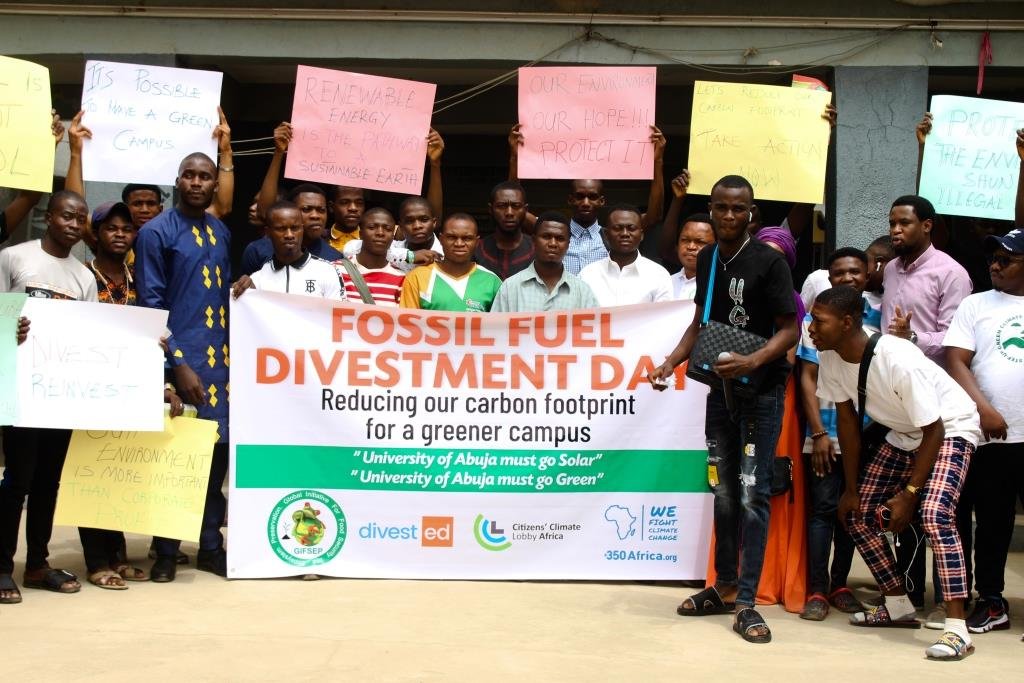
When asked about what to expect after this divestEd initiative, Joseph Ibrahim of GIFSEP said “We are still having issues of unstable electricity supply. We believe this initiative will inspire the students and the university to take on renewable energy and create an example for other campuses and schools and hopefully Nigeria as a whole. ”
I was at University of Abuja today to make a climate change presentation and joined the students to demand for a greener campus #F2D2 #FossilFuelDivestmentDay #Afrikavuka pic.twitter.com/0J1CMcunDl
— Joseph Ibrahim (@joeibro) February 13, 2020
Both teams joined the Fossil Fuel Divestment Day or divestEd, a mobilisation moment led by US divestment students to demand specific institutions to divest from fossil-fueled destruction of land, air, and water and re-invest in renewable energy.
Author: Rukiya Khamis, 350Africa.org Anglophone Field Organizer.
Integrating renewable energy agenda into Accra’s districts development plans
In 2020, 350 Ghana Reducing Our Carbon’s work (GROC) is focused on creating awareness on renewable energy and will be working closely with 5 districts of the Greater Accra to develop local renewable energy plans in their efforts to activate Renewable Energy programming contributing to a substantial impact to Ghana’s Energy Policy by 2030.
This week, GROC hosted a workshop in Ayawaso West Municipal Assembly, which is one of the 260 Metropolitan, Municipal and District Assemblies (MMDAs) and forms part of the 29 MMDAs in the Greater Accra Region.
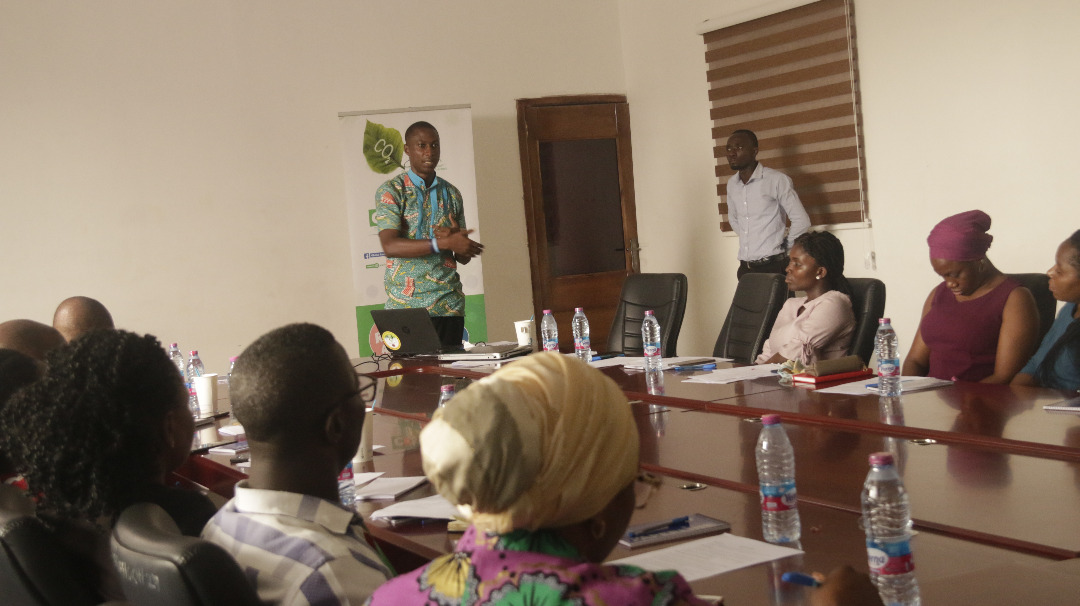
The workshop’s goal was to identify and build partnerships with key stakeholders within that municipality who are working towards the renewable energy agenda and to get insights that would inform the integration of renewable energy section into the Medium Term Development Plan (MTDP) and Action Plan for 2020.
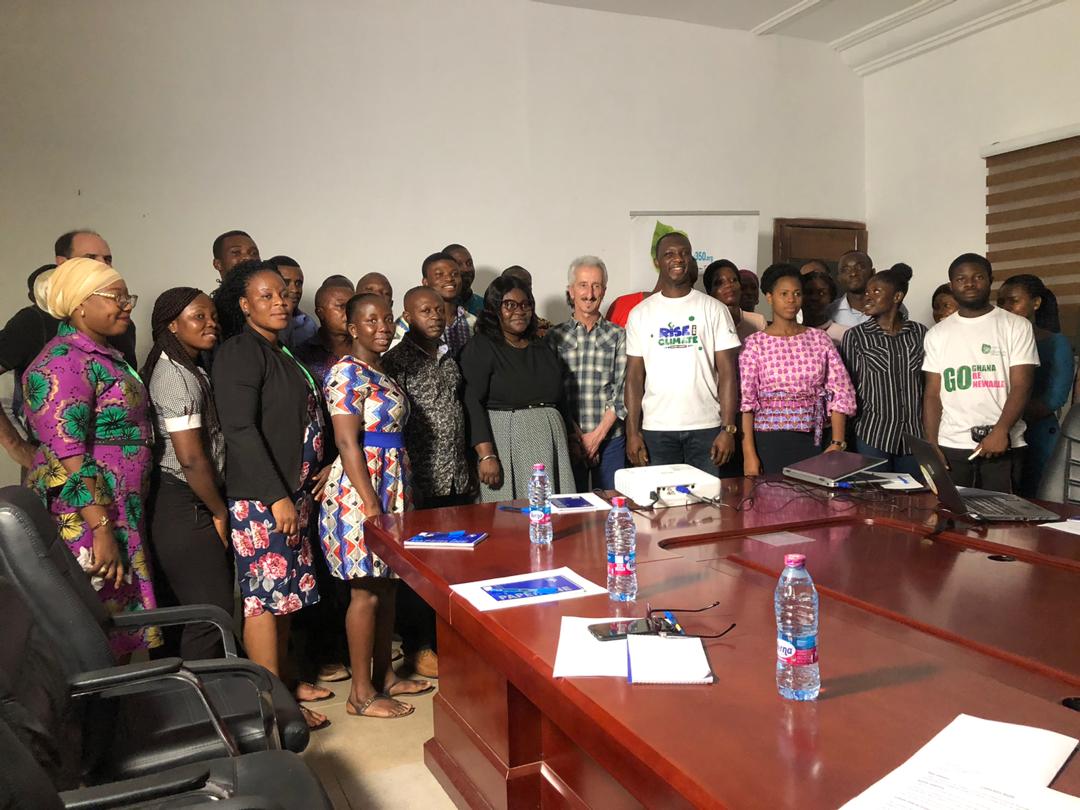
This workshop is the launch of a campaign to get the Renewable Energy agenda integrated into local development plans that will take place throughout the year in four other districts like Ga West Municipal Assembly, Ashaiman district, Accra Metropolitan District and Adentan Municipality.
Author: Rukiya Khamis, 350Africa.org Anglophone Field Organizer
Celebrating the 40th anniversary of St Francis of Assisi as patron of ecology by striking for climate
November 29th this year coincided with the 40 year anniversary of Saint Francis of Assisi as Patron of Ecology. He was declared by Pope John Paul II in 1979 on the same date.
Mother Earth Network in collaboration with The office of Justice Peace and Integrity of Creation Franciscans Africa celebrated the anniversary by striking for climate in the afternoon of Friday, November 29th November, from 3.00 pm to 6.00 pm.
The event brought together 120 participants: Franciscans brothers and sisters, Secular Franciscans, Youfra, the climate movement group from The Catholic University of Eastern Africa and other stakeholders.
The event started with a learning session of conscientization about Laudato Si and St Francis of Assisi spirituality. The discussion was also focused on COP25 happening in Madrid, Spain. In the same regards, some interviews and testimonies were recorded to be shared worldwide.
After that, we e then started the walk for climate justice from the Franciscan Family centre towards The Catholic University of Eastern Africa. During the walk, people were carrying placards and banners with messages like. No need for fossil fuel in Kenya, Mr President to stop any oil business in Kenya, For people in COP25 to honour Paris Agreement etc. The event ended by planting 200 trees for the commemoration of St Francis of Assisi 40 years as patron of ecology.
By Steeven Kezamutima, JPIC Franciscans Africa
As climate talks start in Madrid, a people-centered vision for a fossil-free Africa is gaining ground
The climate crisis has been dominating the mainstream media lately. Every week, we hear about climate-related disasters hitting different regions across the world. At the same time scientists keep sounding the alarm about our diminishing ability to rein in the worst of climate change, activists keep protesting against climate inaction and corporations continue violating human rights.
As the UN and global leaders discuss climate change issues at COP25 - that is the 25th Conference of the Parties to the United Nations Framework Convention on Climate Change (UNFCCC) in Madrid, Spain, Africans are rising in ever-growing numbers to resist the fossil fuels industry and champion adapted and affordable climate solutions. Across Africa, civil society groups and local groups are fiercely working towards setting Africa free from coal, oil and gas dependency. Citizens and communities from Lamu (Kenya) to Bargny (Senegal) to Virunga (Democratic Republic of Congo) to San Pedro (Ivory Coast) and Mpumalanga (South Africa) are standing against big fossil fuel companies that are exacerbating the impacts of climate change. These struggles have felt the need to unite and work closely together under the AfrikaVuka platform to achieve greater results and impact. They deserve recognition, support and solidarity.
We cannot stand and watch our lives, economies, ecosystems and resources being put at risk without speaking out. We refuse to accept that our continent, vulnerable and already severely impacted by the effects of climate change, should become the dumping ground of a dying industry. We denounce and reject the rhetoric that coal companies bring ‘development’ and demand greater and active participation in the discussions on future energy choices. For millions of Africans, climate change continues to worsen inequalities at different levels. Supporting people affected irreversibly by climate change, strengthening adaptation mechanisms and addressing the issue of loss and damage are among other core issues being discussed in Madrid, issues which are the central parts of the Paris Agreement.
Four years ago, the Paris climate agreement was signed at COP21. It wasn’t a perfect agreement, but it was the best we’ve managed to get so far, and one that, if fully implemented, would give us a good chance to avoid the worst-case scenarios on the climate crisis. That agreement set a target to reduce global temperatures well below 2C and aiming for 1.5C. Since then, scientists produced a wealth of increasingly concerning reports and studies confirming how only keeping global temperatures from rising beyond 1.5C we will be able to avoid mass die-off of species, destruction of ecosystems and livelihoods and massive migrations as people are forced to flee their homes to seek refuge elsewhere.
Yet, national governments and other powerful actors have failed so far to deliver the sweeping policies and courageous decisions that would stop the world from burning up even further than it has so far. Emissions keep rising, investments in fossil fuels continue and the most vulnerable among us become more and more so by the minute. There are many reasons why this is happening, many reasons why governments are not acting according to what science dictates and what the people need. Apart from COP21, all other climate talks have often been characterised by hypocrisy, greed, empty promises and procrastination, with big polluters deliberately delaying and sabotaging any significant climate action. The influence of the fossil fuel lobby on our governments and on the climate talks themselves has made it so that real progress has been so far stalled, all to allow a few large corporations and national elites to prosper at the expense of everyone else.
We say “no more”
As the climate crisis escalates, African decision-makers must heed the call of the people and urgently take action by focusing on solutions that eliminate fossil fuels and transition to clean and sustainable energy. At the village, city, district and county levels, people are coming together to challenge the power of the fossil fuel industry. Unions, faith groups and non-environmental groups are joining them to build alternative people-centred solutions. With the continuous energy technology innovations making renewable energy more accessible and affordable, we believe that Africa can and must lead the way in this watershed moment in history, by addressing the climate crisis while creating a more just and equitable world and generating millions of new jobs for its growing youth population powered by technologically advanced renewable sources.
Regardless of the outcomes of the current climate talks in Madrid, the fight against climate change will not stop. It’s clear that a just and rapid transition away from fossil fuels is within reach, in Africa just as anywhere else. In fact, the way we deal with the climate crisis matters as much as how rapidly we act. We cannot expect the climate crisis to be meaningfully addressed unless those in power start taking into consideration other social justice issues such as extreme poverty, extraction, neo-colonialism, lack of freedom and inequality. We cannot see the climate crisis solved without putting at the center the very frontlines communities affected by recurrent floods, droughts, environmental destruction, hunger and forced displacement. COPs will continue to be a failure as long as the UN allows fossil fuel industry lobbyists to walk its halls and to influence complacent politicians not to take the strong action needed against what the UN secretary-general himself calls an “emergency”.
Landry Ninteretse is the Regional Team Leader of 350Africa.org.
Why youth voices matter in tackling the climate crisis
This year, many Local Conference of Youths have aimed at laying strategies to hold our countries accountable and demand for increased action in regards to the Nationally Determined Contributions. Targets were set in reducing national emissions and adapt to the impacts of climate change. The Youths further presented green innovations and different initiatives that each of them is doing in their various communities to combat climate change and contributing to the domestic mitigation and adaptation measures.
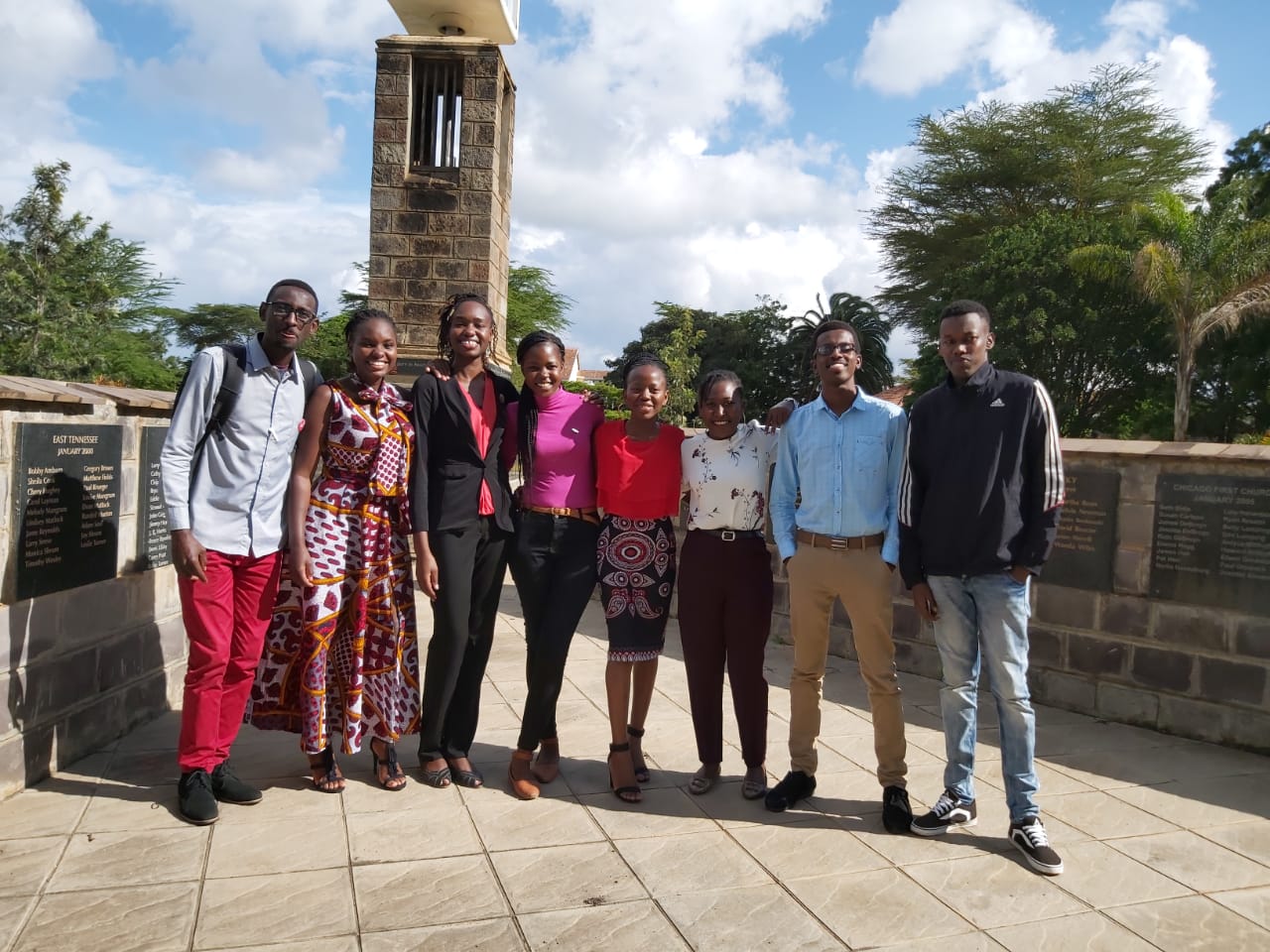
The Local Conference of youths is normally organized to acquaint youths with the upcoming negotiations and lay local strategies that can be applied at the Global Conference of Youths and Conference of parties. However, it was identified that most of the initiatives are still at a small scale and yet they have the potential to be replicated in various communities and countries across the globe.
Many were prepared to present the above presentations but due to the change, we were left asking each other where would our voices be heard at the highest level Conference of Parties?
Despite this, the youth did not throw in the towel and a strong decision was made in the shortest time to have the 15th Conference of Youths at two venues, one in Madrid and the other one in Santiago as formerly planned. Further still, the decision by the Chilean Government did not deter the different Local Conferences of youths that were organized by youths in their different countries across the globe ahead of the Global 15th Conference of youths and the 25th Conference of parties. The youth enthusiasm, collectiveness, and ambitiousness shown on this cannot be taken for granted.
Youths have risen up and are now at the centre of the action with global climate strikes. However, corrupt leaders, multinational corporations and more have kept on failing us, the youth, by not giving us an enabling environment to scale-up our initiatives, excluding us from the decision making processes and most of all only giving us the observer seat at these negotiations. But youths have continued to prove to the world that they are unstoppable, and they cannot be shut down.
Now, the 25th conference of Parties has kicked off and we have managed to show unbelievable courage to continue demanding governments to prioritize Youths and their demands in the upcoming decisions.
As the leaders will be meeting to discuss the future of our planet at COP25, youths in the different countries, communities, cities, towns, villages will also have a global chain of climate actions on 6th December. Youths will leave the negotiation rooms, boardrooms, for action to make visible the emergency and the urgency of climate action. There is hope!
By Joanita Babirye, Girls For Climate
The flowers of revolution
The struggle for human rights starts when another person takes land and subjugates the people of that land through laws that undermine their personhood. So what is liberation? Why does the idea of freedom run in the blood of so many and why is it so contagious? The decolonization of Africa was a radical and transformative period where young leaders took to organizing themselves and spoke of the injustices that saw the majority African population being pushed out of economic participation, being dehumanized and outright exploited for labour.
Colonization was the unadulterated rape of nations in the greedy pursuit of control for our natural resources. And slowly this penetration of colonial power seeped into the social fabric of African livelihoods, manifesting as displacement, the vulnerability of women and children heightened, and poverty and injustice became a daily reality.
Tell me today, African child do you not see the same pattern taking on the form in the fossil fuel industry; greed, a disregard for human life and the suffering of many? Tell me African child do you not see the seeds of discord being sowed among us, with promises of jobs, houses and money while our environment is being ripped to shreds, our diversity is being corroded and we are now forced into the exile of the self.
The continent is not being divided by countries any more as with the Berlin Agreement of 1885, it is being chopped up by Exxon, Shell, BP, Total, Anglo American PLC, Sasol Mining, Glencore Xstrata, Exxaro and South32’s South Africa Energy Coal, Yanzhou Coal, Shaanxi Coal.
And as the impacts of climate change increase and we see the rains don’t come, the signs of the times are here. The direct consequences of man-made climate change include: rising maximum temperatures, rising minimum temperatures, rising sea levels
higher ocean temperatures, an increase or decrease in precipitation ( rain and hail)
shrinking glaciers and thawing permafrost. The indirect consequences of climate change, which directly affect us humans and our environment, include an increase in food and water crises, especially in Africa, health risks through rising air temperatures and heatwaves. The economic implications of dealing with secondary damage related to climate change mean vulnerable African countries will go into more debt when the secure loans from foreign nations with natural resource interests.
I come from a family of activists, we are inherently activists, every single African. In us, we have the spirit of radical leaders who brought freedom to nations such as Jomo Kenyatta(Kenya), Kwame Nkrumah(Ghana), Julius Nyerere(Tanzania), Léopold Sédar Senghor(Senegal), Nnamdi Azikiwe(Nigeria), and Félix Houphouët-Boigny(Côte d'Ivoire)
The hunger for freedom starts with one and catches like wildfire. We have everything to lose and we have run out of patience. We are the flowers of revolution and we demand revolutionary energy for our future. The time to deCOALonize is here. #AfrikaVuka
Join a Global ClImate strike near you www.globalclimatestrike.net
The largest day of climate protest in the planet’s history
In a world with rising sea levels, scorching temperatures, devastating fires and more pollution than we can track, we can’t afford to look away. Science and justice demand that we do more than simply address the symptoms of the climate breakdown. We need to build solutions that will not only keep fossil fuels in the ground but improve the lives of billions of people.
On September 20th - 27th, there will be the first all-ages global climate strike. People will walk out of their jobs — some will plant trees, others will join protests. The targets will be as diverse as the geography: in different parts of the planet, people will be sitting down in front of pipelines; demanding that their institutions divest fossil fuel stocks; urging UN nations to increase their carbon-cutting commitments; calling for carbon taxes; insisting on a Green New Deal. And here in Africa:
In Abuja, Nigeria: People will take to the streets to demand that policymakers make greater strides in environmental policies and laws.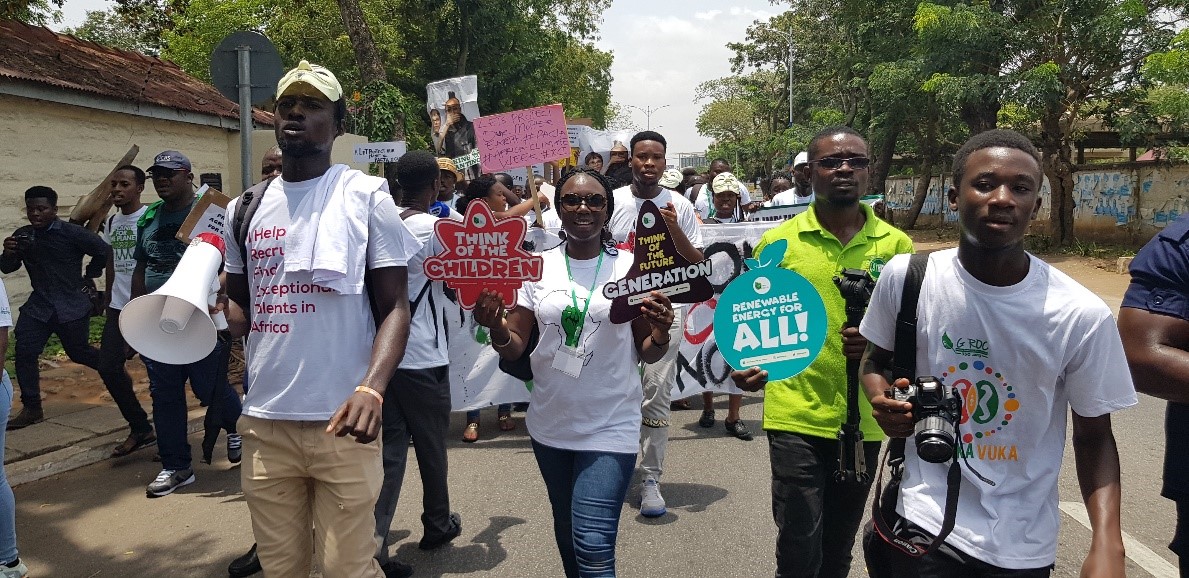
In Cape Town, South Africa: Learners from around 50 schools across the city will protest the South African Government’s lack of action on the climate emergency. 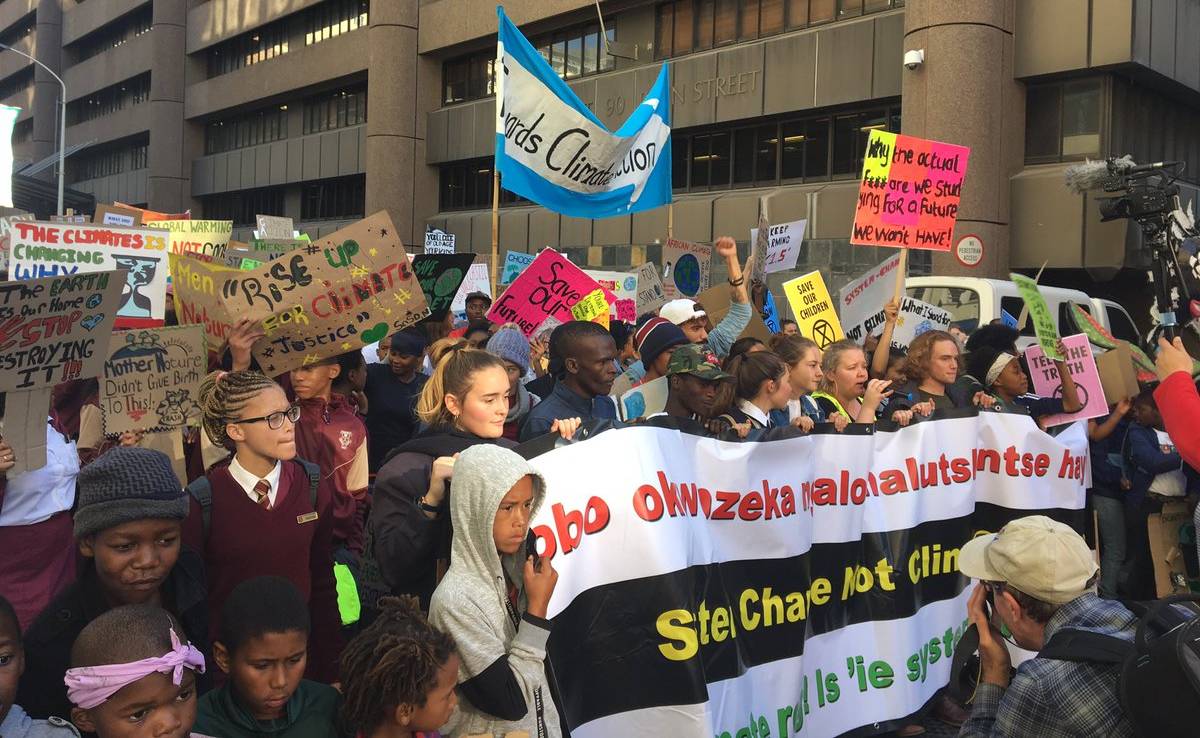
In Goma, Democratic Republic of Congo: local communities, civil society organisations and young people will mobilize around climate issues to inform the population about the climate emergency and call on President Felix Tshisekedi to adhere to national and international conservation laws, protect farmers and prioritize investment in renewable energy. 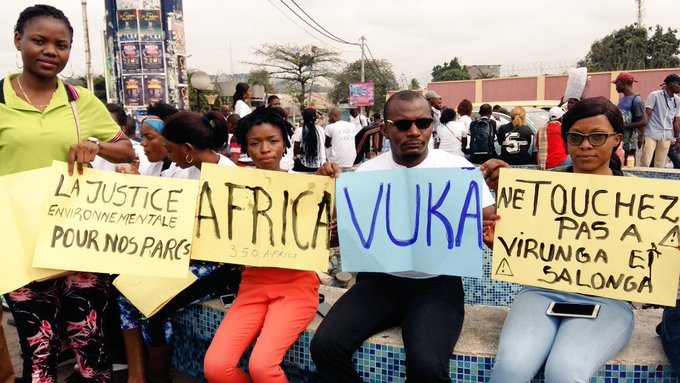
In Johannesburg, South Africa: There will be a peaceful march to call for an acceleration of a just transition towards a low carbon, renewable energy future. 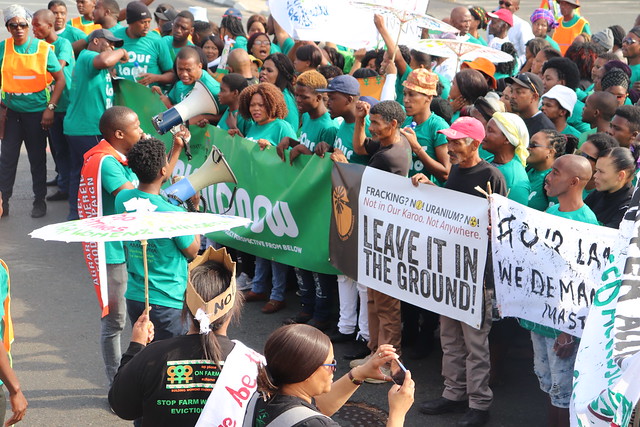
In Kaolack, Senegal, Action Solidaire International is organising a climate camp that will be followed by a march to call on policymakers to stop the Bargny coal-powered station from operating.
In Nairobi, Kenya, Led by thousands of workers, students and youth organizers all across the country are coming together to let their government know that they won’t stand down from their demands for a shift to 100% renewable energy.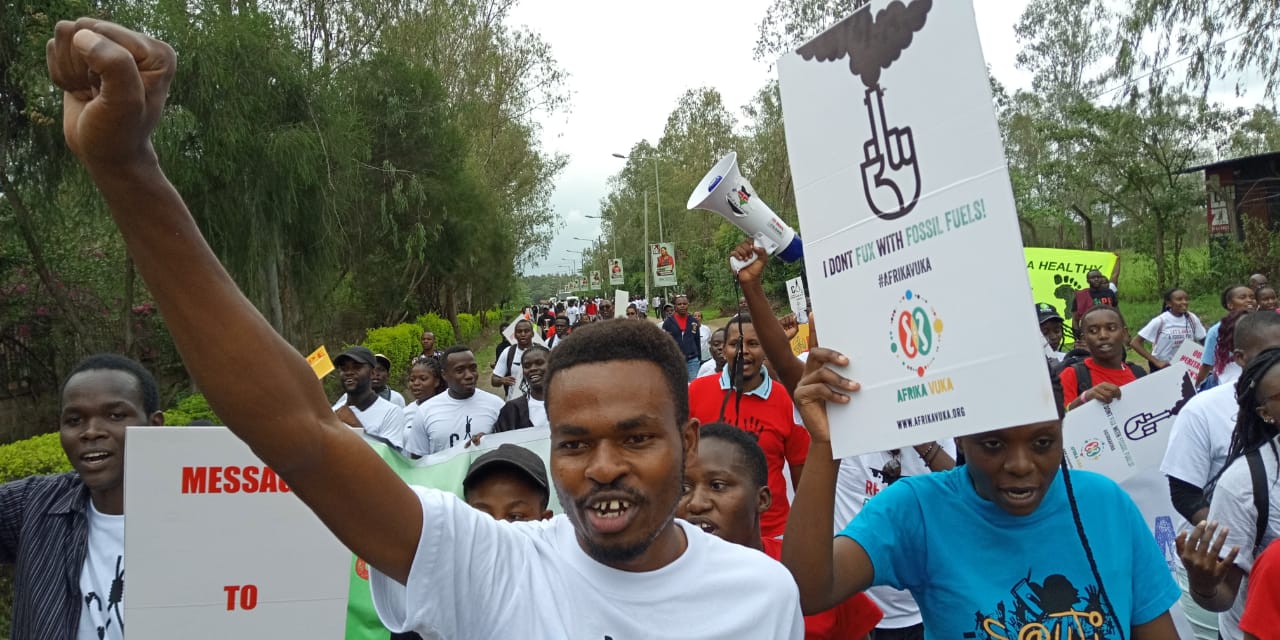
Many more people in Africa and around the world are joining the Global Climate March to demonstrate that there is a global movement demanding real climate action. Check out the website to see if something is planned near you already - or register your own event.
Telling the African Climate Movement Story
Earlier this month, I had the pleasure and privilege to travel to Gisenyi in Rwanda for a #AfrikaVuka digital organizing and storytelling skills training.
About 20 activists gathered from across Africa to participate in the training. We spent 4 days sharing knowledge, stories, and songs, while building trust and digital organizing skills to take the #AfrikaVuka movement to the next level.
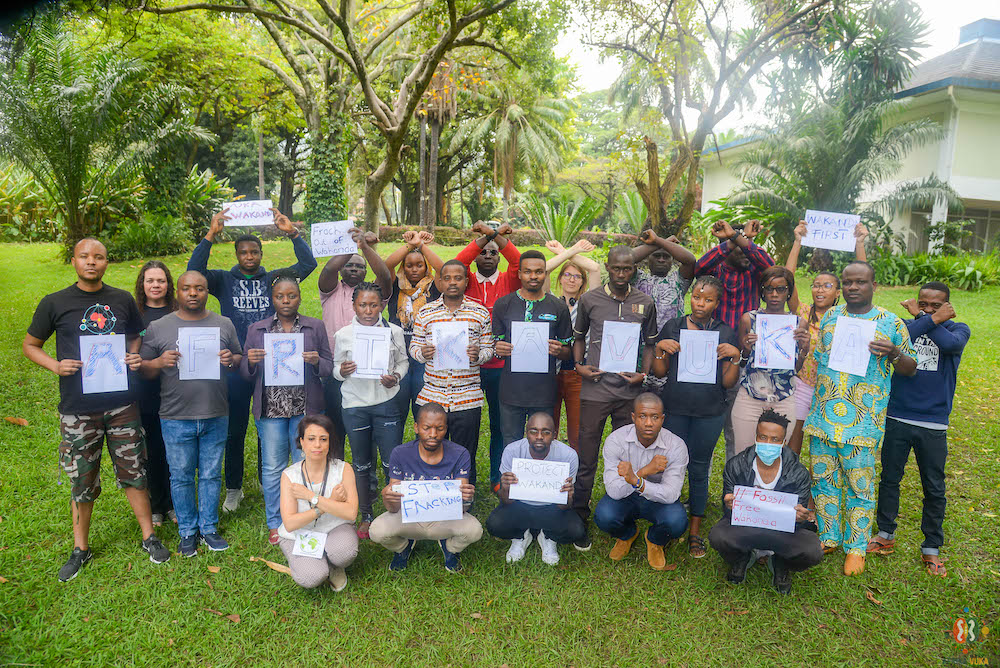
As discussions on the importance of climate stories unfolded, common themes crossing geographic boundaries gave insight into how stories all over Africa are being told. It became imminent that in order to grow the climate movement in Africa, communities living at the frontlines of climate change need to own their stories -- and also challenge the way stories about Africa are told in general.
Entrenched narratives of Africa have often left the continent misunderstood. Crude descriptions of Africa, scaling from the ‘Dark Continent’ to the ‘Emerging One” ignore the complexities of Africa. Instead of trapping Africa into a single story or narrative, this retreat became a space to talk about storytelling practices that speak in their own voice and organizing tools that resonate with people and empower them to tell stories as they are.
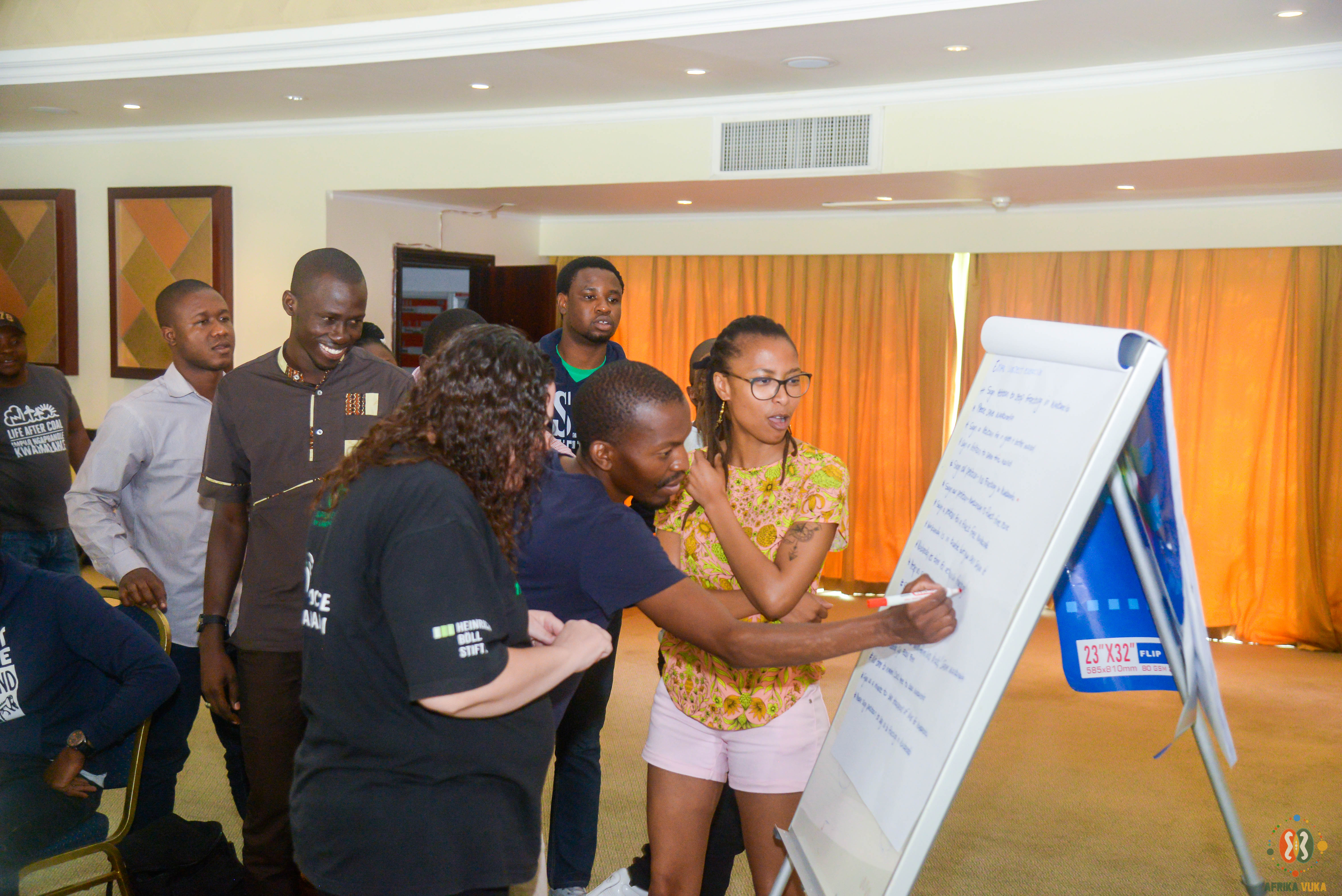
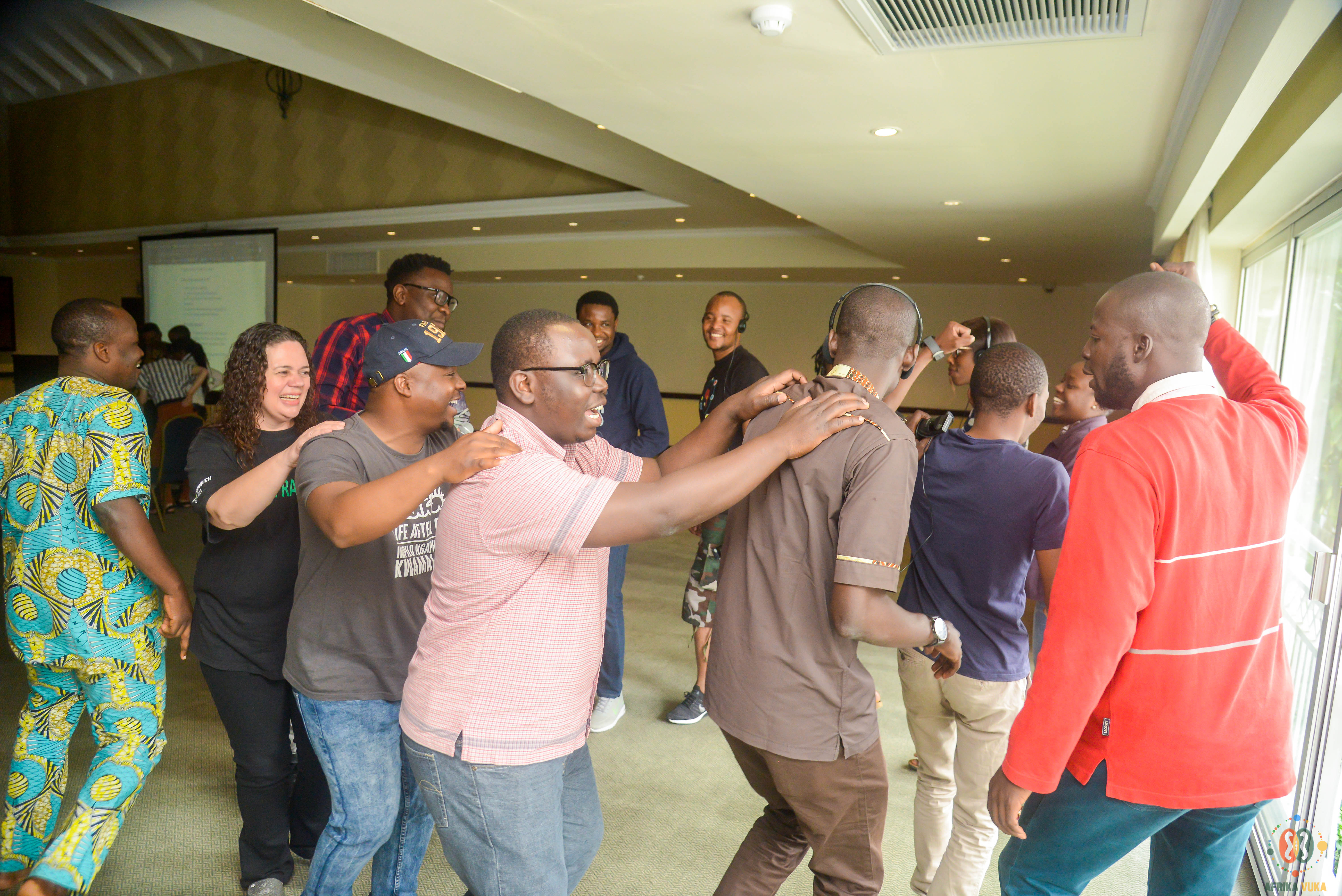
Key take-aways:
- It’s clear that we have to go through a mental shift in our perception of the climate movement in the African context. These experiences can be united with efforts to tackle the climate crisis on a global scale.
- Connecting the climate fights across Africa isn’t only about solidarity, it’s also about strategy. It’s about recognizing that climate change isn’t a single-issue problem. We need to organize not just around climate change, but building the kind of solidarity and unity and that can bring on a massive economic and social transformation that works for everyone -- and use tools and storytelling tactics that speak in individual voices and tools that resonate with our communities.
As the retreat came to a close, a participant shared his story with the group and said: I left my stable life in the UK to go back home and do something about the climate crisis. To me, this is not just about the climate, this is about survival. I can’t think of a better way to convey how I was quickly reminded about the urgency and importance of the work we’re doing together. The need for collective action couldn't be more urgent. As the climate crisis accelerates, it’s up to all of us to take risks for a more just and sustainable world while we still can.
The powerful activists that I met in Gisenyi took their newfound skills and connections back to their local contexts. They’re ready to mobilize in solidarity with communities and take the fight against fossil fuels to the next level. Next stop is the Global Climate Strike. These activists will join thousands of people around the world to organise climate strikes in workplaces and communities on 20 and 27 September. Find out more here.
More: As part of the storytelling session, participants were asked to create content that explains why they’re in the fight for climate justice. Here’s some of what came out it:
Photos:
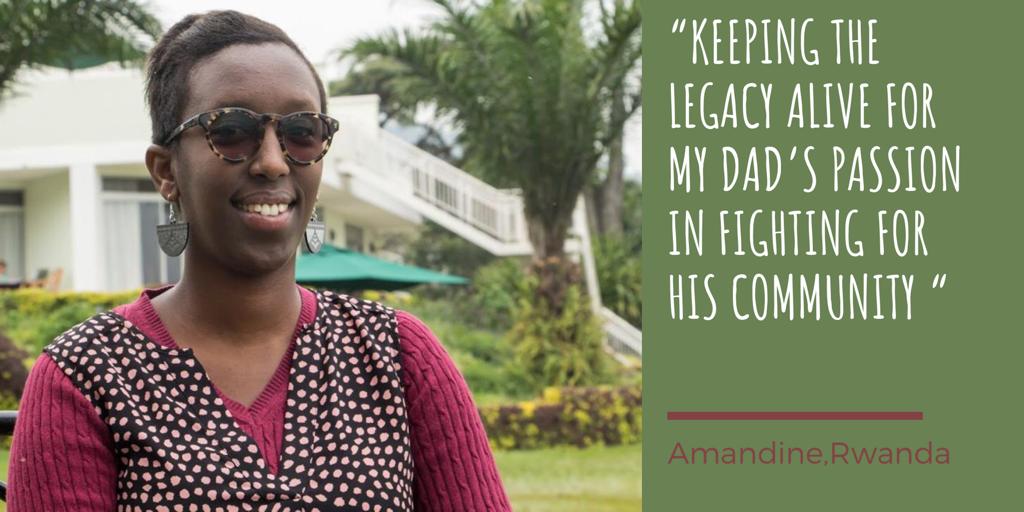
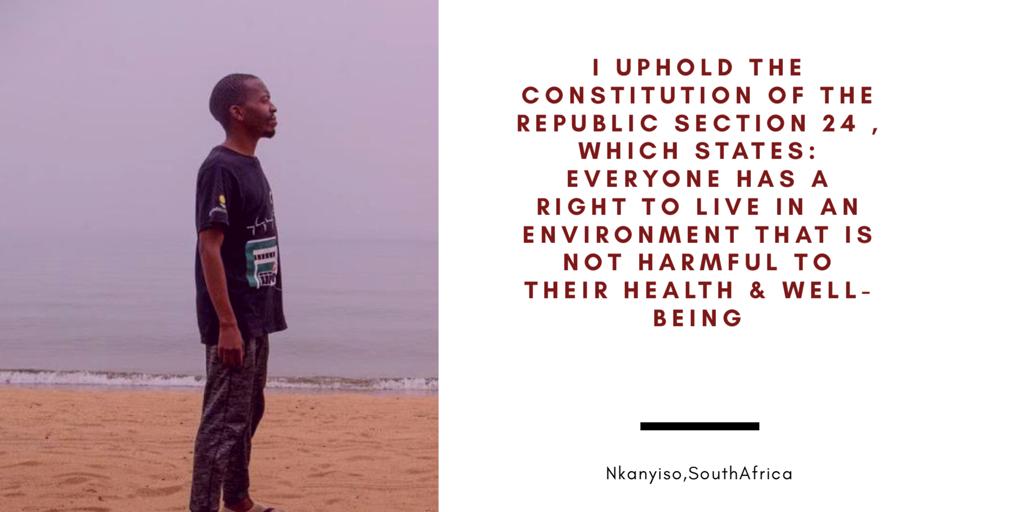
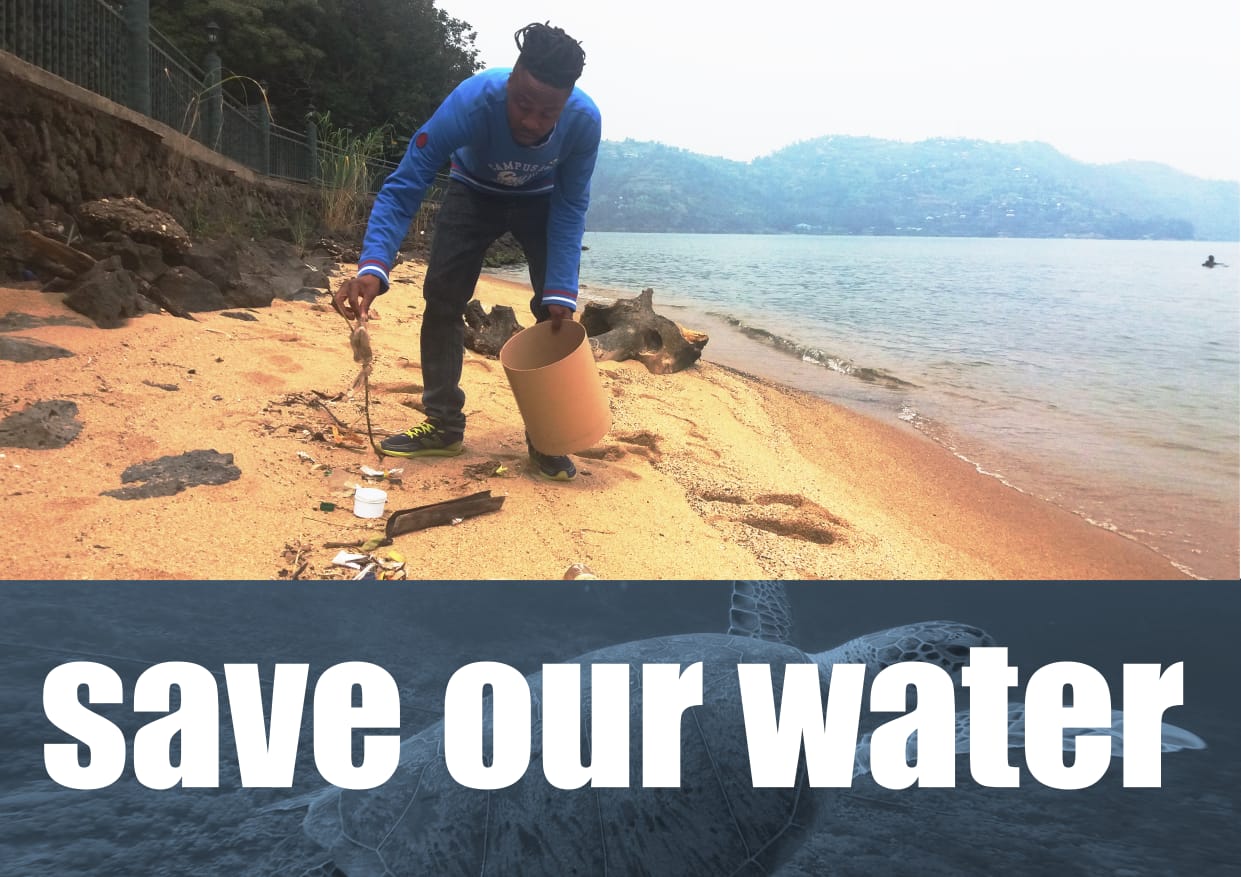
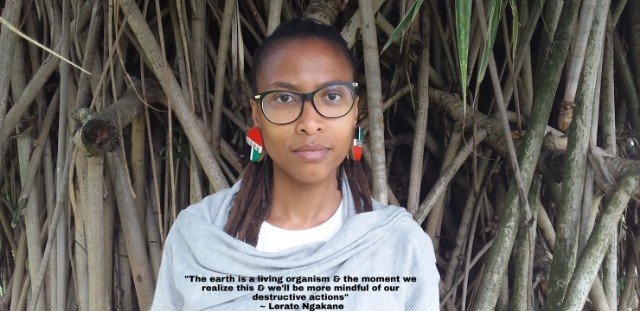
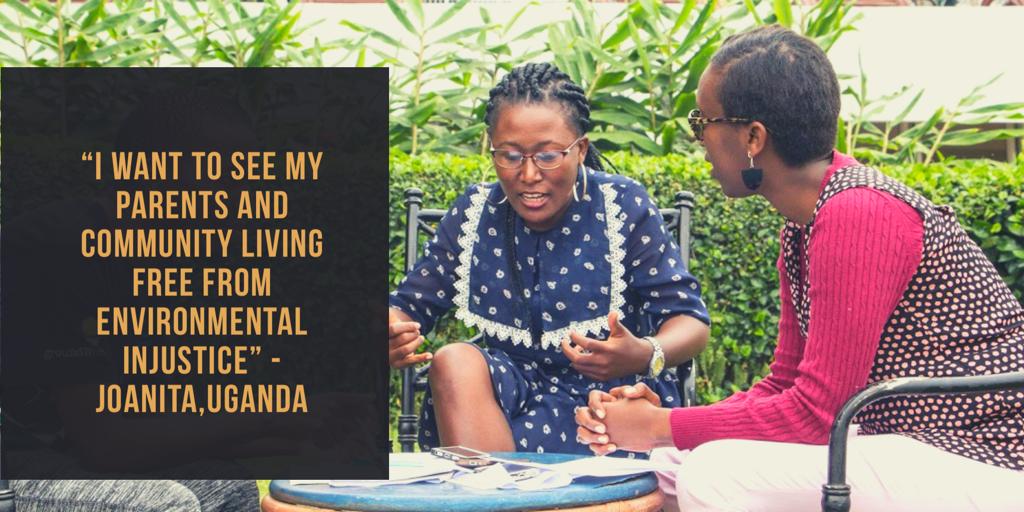
Videos:
Author: Chris Kif, 350Africa Digital Campaign Manager


